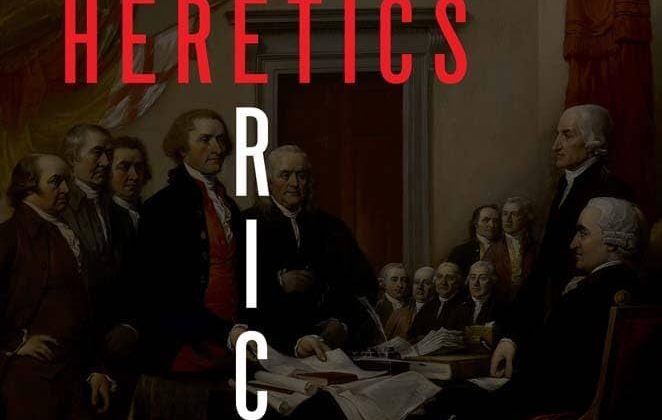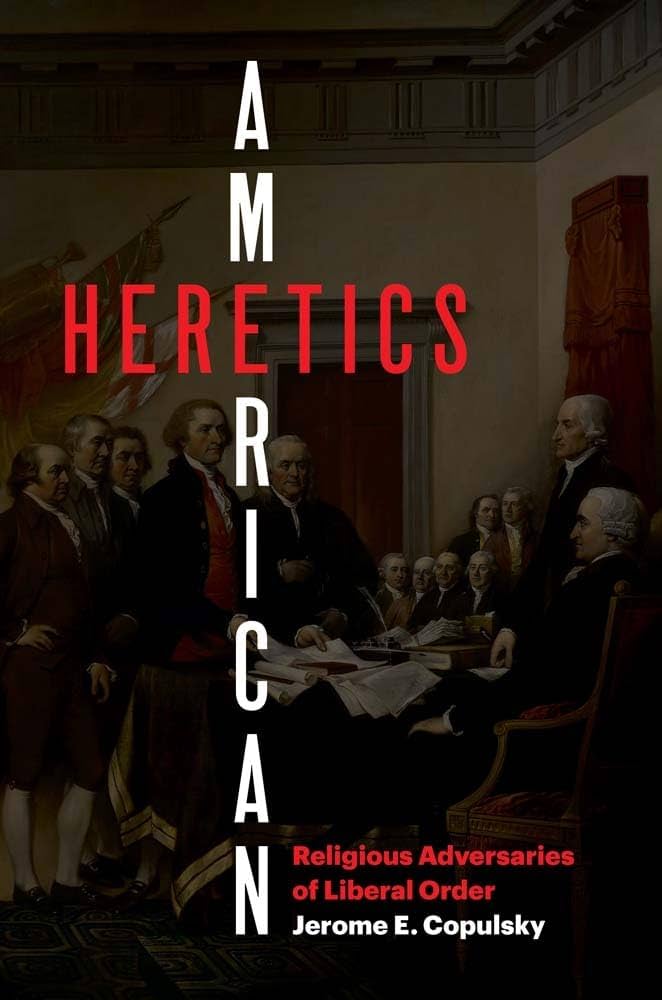

Over at Law & Liberty, Jerome Copulsky and Mark Noll talk about Copulsky’s new book American Heretics: Religious Adversaries of Liberty Order. Here is the setup:
Today we will be speaking to Jerome Copulsky and Mark Noll. The subject will be Jerome’s most recent book, American Heretics: Religious Adversaries of Liberal Order, published last October.
And a review that Mark published for us at Law & Liberty last November of the same book. We figured this would be a wonderful conversation about a really remarkable book, so I’ll just introduce our guests. First is Jerome Copulsky, scholar in residence at the Department of Philosophy and Religion, as well as a research fellow at the Berkley Center for Religion, Peace and World Affairs. Mark Noll is Professor Emeritus at the University of Notre Dame and has written numerous books on the same subject as today’s discussion, perhaps from different valences.
And here is the most interesting part of the conversation. A lot of what Noll says here resonates with James Davison Hunter’s recent argument in Democracy and Solidarity: On the Cultural Roots of America’s Political Crisis.
Mark Noll:
Well, I did raise in the review, the very last paragraph in Jerome’s book, which is an interesting one. The first sentence of the last paragraph is, “If it is to endure, Americans’ liberal democracy will have to be sustained in the absence of a moral consensus or a clear cut, spiritual foundations.” I actually agree with the clear cut, spiritual foundations. More or less in line of what he’s just said, that the aspirations often foreseeing a Christian foundation are not really a kind of loose desire to have space to do what I think needs to be done, but actually a stronger sense that everyone should be doing what …
But then the absence of a moral consensus, I think that’s a harder bridge to cross because of how deeply ingrained, and you can find it in different ways in George Washington, and even in Madison and Jefferson, Joseph’s story, Abraham Lincoln, Reinhold Niebuhr, Martin Luther King Jr., right up to the present, the sense that the United States project does have a transcendent, moral backing. However, it’s wrong to over-particularize it. And I think if the desire to not over-particularize moves to saying, “Well, we can get along without a transcendent, moral canopy of some kind,” I just don’t think that’s right. I don’t necessarily believe that. So I’ll let Jerome have the chance to defend the last paragraph, or at least one part of one sentence in the last paragraph of his book.
Jerome Copulsky:
Yeah, I wasn’t writing a book that was defending a particular kind of non-foundational liberalism. I think that that statement is meant as a descriptive rather than a normative statement. I think that, for better or for worse, we live in a country that … We have 320+ million citizens and non-citizens, who don’t agree. And if we are to continue as a functioning liberal democracy, we’re going to have to find ways of agreeing without those metaphysical agreements. And I hope we are able to do it. What the book shows is that there’s been that strain of disagreement from the very beginning. This is nothing new.
It just may feel more widespread now. And I think I would go back and reaffirm what we were talking about with Lincoln, who in a way, maybe provides a model of the civic language, the civic, moral language that we should consider taking very seriously, maybe returning to. Which is a kind of civic humility, a belief in the project of liberal democracy, as we call it now, but a civic humility in the exercise of that project. So I guess that’s how I would come back and try to defend where I land at the end of the book.
Mark Noll:
Jerome, would it be possible, do you think, to write a comparable book, American Heretics: Progressive Adversaries of Liberal Order?
Jerome Copulsky:
Absolutely. And I think one of … I didn’t say this explicitly in this conversation, but I think it should have come out in the writing, that Abbott himself is a heretic. The reason why I spent so much time outlining Abbott’s argument against the National Reform Association wasn’t because I think he was right, but I think he was also, in his way, attacking the foundations of the American Republic. Now, again, he felt that the amendment was needed to protect his understanding of the republic, as did some of the people in the National Reform Association Coalition. But at the end of the day, they were both interested in taking out that plank of pluralism, whether it is pluralism that allows for people to live secular lives, or pluralism that allows people to live lives within their own religious communities.
Read the entire transcript here.